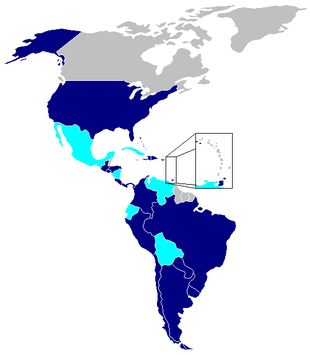Inter-American Treaty of Reciprocal Assistance
| Inter-American Treaty of Reciprocal Assistance. Traité interaméricain d'assistance réciproque. Tratado Interamericano de Assistência Recíproca. Tratado Interamericano de Asistencia Recíproca. | |
|---|---|
|
Member states in dark blue, states that withdrew in cyan | |
| Signed | 2 September 1947[1] |
| Location | Rio de Janeiro[1] |
| Effective | 12 March 1948[1] |
| Condition | ratifications of two-thirds of the Signatory States |
| Signatories | 23[1] |
| Parties | 18[1] |
| Depositary | Pan American Union |
| Languages | English, French, Portuguese and Spanish |
The Inter-American Treaty of Reciprocal Assistance (commonly known as the Rio Treaty, the Rio Pact, or by the Spanish-language acronym TIAR from Tratado Interamericano de Asistencia Recíproca) was an agreement signed in 1947 in Rio de Janeiro among many countries of the Americas.[2] The central principle contained in its articles is that an attack against one is to be considered an attack against them all; this was known as the "hemispheric defense" doctrine. The treaty was initially created in 1947 and came into force in 1948, in accordance with Article 22 of the treaty. The Bahamas was the most recent country to sign and ratify it in 1982.[1]
Members
Current Members:
 Argentina (1948- )
Argentina (1948- ) Bahamas (1982- )
Bahamas (1982- ) Brazil (1948- )
Brazil (1948- ) Chile (1948- )
Chile (1948- ) Colombia (1948- )
Colombia (1948- ) Costa Rica (1948- )
Costa Rica (1948- ) Dominican Republic (1948- )
Dominican Republic (1948- ) El Salvador (1948- )
El Salvador (1948- )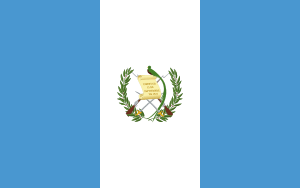 Guatemala (1948- )
Guatemala (1948- )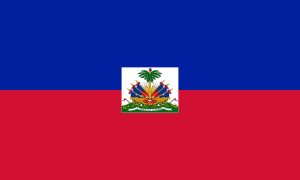 Haiti (1948- )
Haiti (1948- )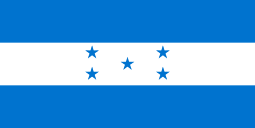 Honduras (1948- )
Honduras (1948- ) Panama (1948- )
Panama (1948- ) Paraguay (1948- )
Paraguay (1948- ) Peru (1948- )
Peru (1948- )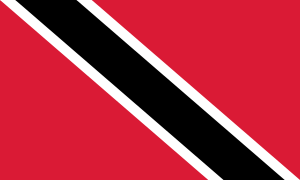 Trinidad and Tobago (1967- )
Trinidad and Tobago (1967- ) United States (1948- )
United States (1948- ) Uruguay (1948- )
Uruguay (1948- )
Former Members:
Background and history
The United States maintained a hemispheric defense policy relative to European influence under the Monroe Doctrine since 1823, which became increasingly interventionist with the Roosevelt Corollary in 1904. During the 1930s the US had been alarmed by Axis overtures toward military cooperation with Latin American governments; apparent strategic threats against the Panama Canal were of particular concern. These were discussed in a series of meetings of the International Conference of American States and the 1936 Inter-American Conference for the Maintenance of Peace.[3] During the war Washington had been able to secure Allied support from all individual governments except Uruguay, which remained neutral, and Argentina, whose government was not recognized by the Allied powers.[3] Some countries had signed the Declaration by United Nations in early 1942 and more had signed by the end of 1945. At the Inter-American Conference on the Problems of War and Peace, in Mexico City during February and March 1945, discussions of the post-war world order were held and produced the Act of Chapultepec.[3][4]
In light of the developing Cold War and following the statement of the Truman Doctrine, the US wished to make those new anti-communist commitments permanent. The Inter-American Treaty of Reciprocal Assistance was the first of many so-called 'mutual security agreements',[5] and the formalization of the Act of Chapultepec. The treaty was adopted by the original signatories on 2 September 1947 in Rio de Janeiro (hence the colloquial name "Rio Treaty"). It came into force on 3 December 1948 and was registered with the United Nations on 20 December 1948.[1]
The treaty was invoked numerous times during the 1950s and 1960s, in particular supporting the United States' naval blockade unanimously during the Cuban Missile Crisis. With the exceptions of Trinidad and Tobago (1967) and the Bahamas (1982), no countries that became independent after 1947 have joined the treaty; Canada is yet to become a member. During the Falklands War (Malvinas in Spanish), the United States, despite having signed the Rio Treaty before the NATO alliance, arguing that Argentina was the aggressor, favoured the United Kingdom, as did Chile and Colombia. This was seen by most Latin American countries as the final failure of the treaty.[6][7] In 2001, the United States invoked the Rio Treaty after the September 11 attacks; however only four Latin American countries (Honduras, Dominican Republic, Nicaragua, and El Salvador) contributed troops to the Iraq War[8] while two others (Colombia and Panama) were members of the "Coalition of the Willing."[9] In September 2002, citing the Falklands example[10][11] and anticipating the Iraq War, Mexico formally withdrew from the treaty; after the requisite two years, Mexico ceased to be a signatory in September 2004.
On 2008, the Union of South American Nations (UNASUR) created a new regional security council to take care of their own defence issues.[12][13]
On 5 June 2012, ALBA countries Bolivia, Ecuador, Nicaragua and Venezuela, under the leadership of leftist governments, initiated the retirement from the TIAR,[14][15] a decision which the Obama Administration deplored as "unfortunate" but respected.[16] The treaty has been denounced by Nicaragua on 20 September 2012, Bolivia on 17 October 2012, Venezuela on 14 May 2013, and Ecuador on 19 February 2014.
See also
- Military alliance
- SICOFAA
- Mutual Defense Assistance Act
- Mutual Security Act
- United States-Latin American relations
References
- 1 2 3 4 5 6 7 "B-29: INTER-AMERICAN TREATY OF RECIPROCAL ASSISTANCE (RIO TREATY)". Organization of American States. Retrieved 1 March 2014.
- ↑ Inter-American Treaty of Reciprocal Assistance definition of Inter-American Treaty of Reciprocal Assistance in the Free Online Encyclopedia.
- 1 2 3 Act of Chapultepec The Oxford Companion to World War II, 2001, I. C. B. Dear and M. R. D. Foot
- ↑ Act of Chapultepec: Declarations on Reciprocal Assistance and American Solidarity, March 3, 1945, Pillars of Peace, Documents Pertaining To American Interest In Establishing A Lasting World Peace: January 1941-February 1946, Book Department, Army Information School, Carlisle Barracks, Pa., May 1946
- ↑ Alliances, Coalitions, and Ententes - The American alliance system: an unamerican tradition
- ↑ the deep weakening of hemispheric relations occurred due to the American support, without mediation, to the United Kingdom in the Malvinas war in 1982, which definitively turned TIAR in dead letter The Brazilian foreign policy and the hemispheric security
- ↑ El episodio dejó un mal sabor de boca en muchas de las cancillerías latinoamericanas, que pensaban que el TIAR era un mero papel mojado o una herramienta sólo al servicio de EEUU.
- ↑ Wikipedia List of coalition countries do we need to repeat all sources here?
- ↑ White House.org: "Who are the current coalition members?" March 27, 2013
- ↑ OEA: México abandona el TIAR (BBC Mundo)
- ↑ OAS official document: He cited the 1982 conflict over the Malvinas Islands as a classic demonstration of the Treaty's failure
- ↑ Nace UNASUR y alianza militar sin EE.UU.
- ↑ La defensa regional en manos propias: UNASUR
- ↑ Bolivia, Ecuador, Nicaragua y Venezuela dejan el mecanismo de defensa TIAR
- ↑ ALBA countries renounced the TIAR in OAS Assembly
- ↑ EEUU lamenta que Bolivia, Ecuador, Nicaragua y Venezuela se retiren de TIAR
